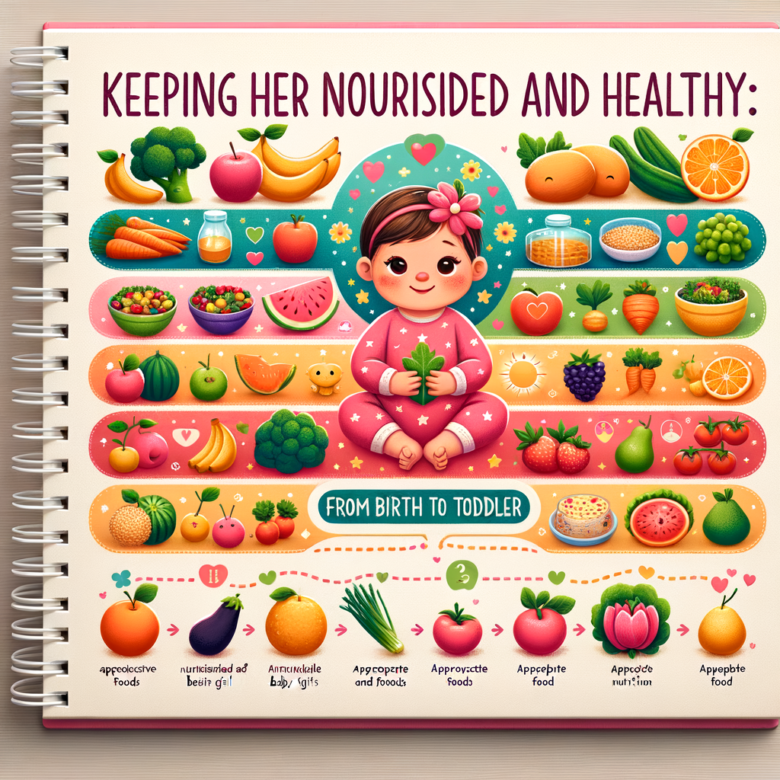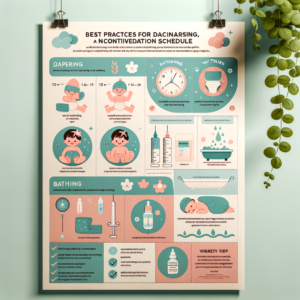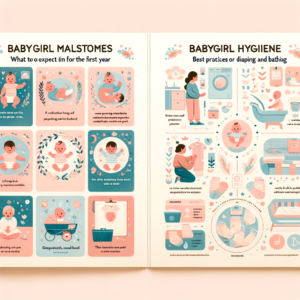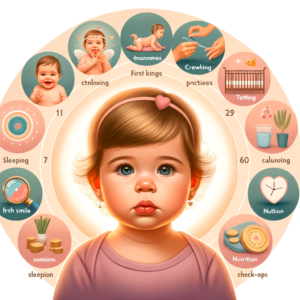Proper nutrition is crucial for your babygirl’s growth, development, and overall health. This comprehensive guide will walk you through the nutritional needs of your little one from birth through the toddler years, ensuring she gets the best start in life.
Newborn Nutrition (0-6 months)
During the first six months, your babygirl’s nutrition should come exclusively from breast milk or formula.
Breastfeeding
- Recommended as the optimal source of nutrition for the first 6 months
- Provides antibodies that boost immune system
- Frequency: 8-12 times per day in the early weeks
Tips for successful breastfeeding:
- Ensure proper latch
- Feed on demand
- Stay hydrated and maintain a healthy diet
Formula Feeding
- Choose an iron-fortified infant formula
- Follow preparation instructions carefully
- Frequency: Every 2-3 hours, or 6-8 times per day
Important: Never dilute formula or use homemade formulas without medical supervision.
Introducing Solid Foods (6-12 months)
Around 6 months, your babygirl may be ready for solid foods alongside breast milk or formula.
Signs of Readiness
- Can sit up with support
- Good head and neck control
- Shows interest in food
- Lost tongue-thrust reflex
First Foods to Introduce
- Iron-fortified single-grain cereals
- Pureed vegetables (e.g., sweet potatoes, carrots)
- Pureed fruits (e.g., apples, bananas)
- Pureed meats
Tips for introducing solids:
- Start with one new food at a time
- Wait 3-5 days before introducing another new food to watch for allergies
- Begin with thin purees and gradually increase thickness
Nutrition for Older Babies (9-12 months)
As your babygirl grows, her nutritional needs and abilities change.
Foods to Introduce
- Soft, mashed foods
- Finger foods (e.g., small pieces of soft fruits, well-cooked vegetables)
- Protein sources like eggs, tofu, and well-cooked meats
- Dairy products like yogurt and cheese
Feeding Schedule
- 3 meals per day plus 2-3 snacks
- Continue breastfeeding or formula feeding
Note: Avoid honey until after 12 months due to risk of botulism.
Toddler Nutrition (1-3 years)
Your babygirl is now a toddler with changing nutritional needs and eating habits.
Key Nutrients for Toddlers
- Protein for growth
- Calcium and Vitamin D for bone development
- Iron for brain development
- Healthy fats for brain and eye development
Balanced Diet for Toddlers
- Fruits and vegetables: 1-1.5 cups each per day
- Grains: 3 ounces per day, preferably whole grains
- Protein: 2 ounces per day
- Dairy: 2 cups per day
Dealing with Picky Eating
- Offer a variety of healthy foods
- Be patient and persistent
- Make mealtime fun and engaging
- Set a good example by eating healthy foods yourself
Foods to Avoid
Certain foods pose choking hazards or are not suitable for young children:
| 1. Whole grapes or cherry tomatoes (cut into quarters) |
|---|
- Popcorn
- Hard candies
- Hot dogs (unless cut into very small pieces)
- Large globs of peanut butter
- Raw vegetables
Hydration
Proper hydration is crucial for your babygirl’s health.
- 0-6 months: Breast milk or formula provides adequate hydration
- 6-12 months: Introduce small amounts of water with meals
- Toddlers: 4 cups of fluids per day, including water and milk
Avoid: Sugary drinks, including fruit juices
Vitamin Supplements
Consult your pediatrician about vitamin supplements, especially:
- Vitamin D for breastfed babies
- Iron supplements if recommended
- Multivitamins for picky eaters or those with restricted diets
Food Allergies
Be vigilant about potential food allergies:
| 1. Introduce common allergens one at a time (e.g., eggs, peanuts, fish) |
|---|
- Watch for signs of allergic reactions (hives, swelling, difficulty breathing)
- Consult your pediatrician if you have concerns about allergies
Frequently Asked Questions
Q: When should I start giving my babygirl water? A: Small amounts of water can be introduced with solid foods around 6 months.
Q: How do I know if my babygirl is getting enough to eat? A: Regular weight gain, contentment after meals, and plenty of wet diapers are good indicators.
Q: Should I be concerned if my toddler is a picky eater? A: Picky eating is common in toddlers. Focus on offering a variety of healthy foods and be patient.
Q: Is it okay to give my babygirl fruit juice? A: It’s best to avoid fruit juice for babies under 12 months. After that, limit juice intake and prefer whole fruits.
Q: When can I introduce cow’s milk as a main drink? A: Whole cow’s milk can typically be introduced at 12 months of age.
Conclusion
Providing proper nutrition for your babygirl from birth through the toddler years sets the foundation for a lifetime of healthy eating habits. Remember that every child is unique, and growth patterns can vary. Always consult with your pediatrician if you have concerns about your babygirl’s nutrition or growth.
By offering a variety of nutritious foods, staying attuned to your babygirl’s hunger cues, and creating positive mealtime experiences, you’re giving her the best possible start in life. Enjoy this journey of nourishing your little one and watching her grow and thrive!



